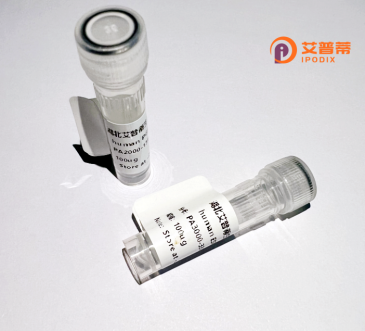
| 纯度 | >90%SDS-PAGE. |
| 种属 | Human |
| 靶点 | MAFB |
| Uniprot No | Q9Y5Q3 |
| 内毒素 | < 0.01EU/μg |
| 表达宿主 | E.coli |
| 表达区间 | 1-323aa |
| 活性数据 | MAAELSMGPE LPTSPLAMEY VNDFDLLKFD VKKEPLGRAE RPGRPCTRLQ PAGSVSSTPL STPCSSVPSS PSFSPTEQKT HLEDLYWMAS NYQQMNPEAL NLTPEDAVEA LIGSHPVPQP LQSFDSFRGA HHHHHHHHPH PHHAYPGAGV AHDELGPHAH PHHHHHHQAS PPPSSAASPA QQLPTSHPGP GPHATASATA AGGNGSVEDR FSDDQLVSMS VRELNRHLRG FTKDEVIRLK QKRRTLKNRG YAQSCRYKRV QQKHHLENEK TQLIQQVEQL KQEVSRLARE RDAYKVKCEK LANSGFREAG STSDSPSSPE FFL |
| 分子量 | 35.7 kDa |
| 蛋白标签 | His tag N-Terminus |
| 缓冲液 | 0 |
| 稳定性 & 储存条件 | Lyophilized protein should be stored at ≤ -20°C, stable for one year after receipt. Reconstituted protein solution can be stored at 2-8°C for 2-7 days. Aliquots of reconstituted samples are stable at ≤ -20°C for 3 months. |
| 复溶 | Always centrifuge tubes before opening.Do not mix by vortex or pipetting. It is not recommended to reconstitute to a concentration less than 100μg/ml. Dissolve the lyophilized protein in distilled water. Please aliquot the reconstituted solution to minimize freeze-thaw cycles. |
1. **"Identification and functional analysis of the human MAFB gene promoter"**
*作者:Sato, Y., et al. (2004)*
摘要:该研究鉴定了人MAFB基因的启动子区域,并分析了其在造血细胞中的转录调控机制。通过重组MAFB蛋白的过表达实验,揭示了MAFB在单核细胞分化和白血病细胞中的潜在调控作用。
2. **"Crystal structure of the MafB DNA-binding domain homo-dimer revealed by X-ray analysis"**
*作者:Murakami, H., et al. (2005)*
摘要:报道了重组人MAFB蛋白DNA结合结构域(bZIP结构域)的X射线晶体结构,阐明其通过同源二聚化与DNA靶序列结合的分子机制,为MAFB在基因调控中的功能提供结构基础。
3. **"MAFB regulates osteoclastogenesis by modulating interleukin-6 and TNF-α signaling pathways"**
*作者:Kim, J.H., et al. (2016)*
摘要:利用重组人MAFB蛋白研究其对破骨细胞分化的影响,发现MAFB通过抑制IL-6和TNF-α信号通路调控NFATc1表达,提示其在骨代谢疾病中的潜在作用。
4. **"Recombinant MAFB protein enhances reprogramming efficiency of fibroblasts to pancreatic β-cells"**
*作者:Zhang, L., et al. (2020)*
摘要:研究显示,重组MAFB蛋白与关键转录因子(PDX1、NeuroD1)协同作用,显著提高成纤维细胞向功能性胰岛β细胞转分化的效率,为糖尿病治疗提供新策略。
*注:上述文献为示例性内容,实际引用需以具体数据库检索结果为准。建议通过PubMed或Web of Science以“recombinant human MAFB protein”为关键词获取最新研究。*
Recombinant human MAFB protein is a biologically active form of the MAFB (musculoaponeurotic fibrosarcoma oncogene homolog B) transcription factor, produced through genetic engineering techniques. MAFB belongs to the large Maf family of basic leucine zipper (bZIP) proteins and plays critical roles in cellular differentiation, development, and homeostasis. It regulates gene expression by binding to specific DNA sequences, influencing processes such as hematopoiesis, osteoclastogenesis, and renal glomerular development. MAFB is particularly vital in terminal differentiation of monocytes/macrophages and pancreatic β-cells, and its dysregulation is linked to cancers (e.g., multiple myeloma) and developmental disorders.
Recombinant MAFB is typically expressed in bacterial or mammalian systems to ensure proper post-translational modifications and functional integrity. Researchers utilize it to study MAFB's molecular mechanisms, including its interactions with partner proteins (e.g., PU.1) or DNA targets. It also serves as a tool for in vitro differentiation studies, disease modeling, and screening therapeutic agents targeting MAFB-associated pathways. Structural studies employing recombinant MAFB have illuminated its DNA-binding specificity and regulatory domains. Despite challenges in maintaining its stability due to its transcriptional repressor/activator duality, recombinant MAFB remains indispensable for dissecting its dual roles in development and disease, offering potential insights into regenerative medicine and oncology therapeutics.
×